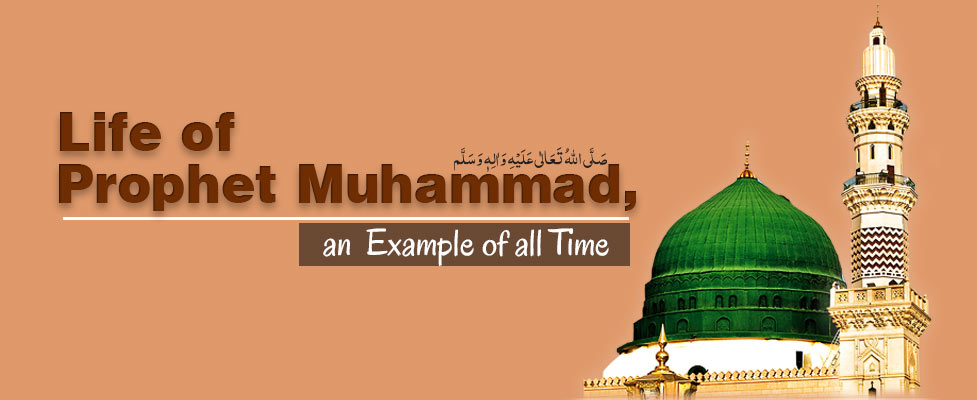Before starting my report, let me put something as a provision- I have flaws as I am human. I am reminding this concept to myself the same as I am reminding all of you. The best way of learning is to teach and discuss. To teach this concept, it requires me to write, compile, and reorganize. Forgive me if I make any mistake.
Ethics and The Life of Prophet Mohammad ﷺ, a topic very important in explaining the ethics and its importance in everyday life. Prophet Mohammad’s ﷺ life revolves around the ethical practices in every field of life. You’ll find all types of ethics which are being practiced in today’s modern world in the life of Prophet Mohammad ﷺ. In fact, Prophet Mohammad ﷺ introduced those ethics and proved their effectiveness. Even the worst enemies of Prophet ﷺ were a believer of the fact that he never lies and he has great integrity, honesty, and dignity.
The character he ﷺ has was the best of all examples for the entire world not just for Muslims. Prophet ﷺ has spread Islam in this world with the help of his character. He had the power of character and great ethics which neither a single person ever matched nor till the end of this universe. He had the power of Ethics. Prophet ﷺ was a man of honor. A person who tries to follow his way of life is known as ‘Momin’ in Islam, a person who is best amongst the Muslims. A number of people in this world accepted Islam because of the teachings of Mohammad ﷺ and himself following those teachings of high moral grounds.
Verily, I was sent for no other reason, except to perfect the noble traits of character.(Muwatta Imam Malik)
Early Life of Prophet Mohammad ﷺ
Mohammad ﷺ has born in 570 A.D in Mecca, Saudi Arabia. Father of Mohammad ﷺ has died before he ﷺ was born. And his ﷺ mother also died when he was only 6 years old in 577 A.D. He was first raised by his Grandfather and then by his uncle Abu Talib Ibn-e- Abu Mutalib. His ﷺ family was poor but respectable in Arab, called Quraysh Tribe. They were active in politics and trade in Mecca. Trading was the major source of earning for the tribes living in Mecca. Muhammad ﷺ started going to trade with his uncle Abu Talib at the age of 9.
Ethics in The Life of Mohammad ﷺ
Mohammad ﷺ, in his whole life, lived with high moral ethics and character. He ﷺ taught his followers to live life with high moral values. He believed that the best to spread Islam in the hearts in people is to practice it. Your behaviour must indicate your ethics and your values. Islam teaches high morality which everyone should be able to practice in his whole life. Majority of Islamic teachings are based on ethics and morality. Muslims all around the world look up to Mohammad ﷺ as their role model. He ﷺ has sent to this world to teach people the way of life and the teachings of Allah Almighty.
The most perfect believer in terms of belief is the one who has the highest ethics and who treats his family in the nicest way.(Abu Dawood, Sunnah, 14)
Islam really takes the issue of ethics seriously. A person can never be a good Muslim until or unless he is not ethical. The goal of Prophet ﷺ was also to improve the behaviors and manners of the people. The religion of God is 100% complete and was brought to us by the best of mankind, the Prophet Muhammad (peace and blessings be upon him). He appeared in the heart of a desert which was almost the most uncivilized part of the then inhabited world and where people were immersed in the worst kinds of immorality.
Some of the moral values and teachings of Prophet ﷺ are as follows,
Truthfulness
Prophet Muhammad (peace and blessings be upon him), said:
I order you to be truthful, A true action leads to the path of virtue and good deeds, and virtue paves the way of a person to Paradise, and the said person continues to speak the truth till in the sight of God he is named Siddiq (Truthful). Lying leads to vice, and vice leads to indecent acts and a person goes on lying till in the sight of God he is named a liar.(Bukhari and Muslim)
The person who speaks truth is regarded as respectful in the eyes of people and the also receives the blessings of Allah SWT. Ali ibn Abi Talib mentioned the positive reciprocal effect of behaving truthfully with people in this worldly life:
Whoever does three things with regards to people, they will necessitate three things from him: whenever he speaks to them he is truthful; whenever they entrust him with something he does not betray them; and whenever he promises them something he fulfils it. If he does this, their hearts will love him; their tongues will praise him; and they will come to his aid(Ibn Muflih, Adaab ash-Shari’a).
Allah says in Qur’an:
And whosoever obeys God and His Messenger, such will be in the company of those whom God has blessed: the Prophets, the truthful ones, the martyrs, and the righteous. And how excellent a company are such people! (Quran 4:69)
Trustworthiness
The Messenger of God (peace and blessings be upon him) was the embodiment of trustworthiness. The Makkans called him ‘the Trustworthy One.’ Even after the declaration of his Prophethood, they continued to entrust their precious goods to him although they regarded him as an enemy.
Read more: 7 deeds you must do in the last Ashra of Ramadan
The Prophet Mohammad ﷺ was the most trustworthy person in Makkah. People called him ‘the Trustworthy One.’ Even the people who opposed Islam and regarded him as an enemy, still entrusted their precious goods to Prophet ﷺ.
He warned people against breaking one’s trust, lying and breach of trust.
Like breaching a trust and breaking one’s word, lying was also, in his words, ‘a sign of hypocrisy.(Abu Dawud, Adab, 80; I. Hanbal, 3.447)
He was not only against deceiving humans but even warned people against deceiving animals.
Prophet ﷺ also warned people of deceiving animals, not just humans. Once, annoyed at seeing one of his companions call his horse using deception, he said:
You should give up deceiving animals. You should be trustworthy even in your treatment of them.(Bukhari, Iman, 24; Muslim, Iman, 107)
Prophet Muhammad (peace and blessings be upon him) was asked by one of his companions:
…Are we rewarded for kindness towards animals?
Mohammad (peace and blessings be upon him) replied,
There is a reward for kindness to every living being. (Sahih al – Bukhari)
Communication Manners of Prophet Mohammad ﷺ
Today, the world is so modernized that many new ways of communication have evolved, like phones, messenger, chats, WhatsApp, Twitter, etc. Communication manners should be thought of well by the Muslims, we are accounted for every word, so we should be very careful in our everyday communications whether it’s through social media or not. We can be sinned or rewarded because of what we speak or type.
Also Read about Shab e Barat and Its importance in Islam
But We have certainly tried those before them, and Allah will surely make evident those who are truthful, and He will surely make evident the liars.[Quran, 29:3]
Forbidding Suspicion and Backbiting
The Qur’an declares:
O you who believe! Avoid much of suspicion for suspicion in some cases is a grave sin. And spy not, neither backbite one another. Would one of you like to eat the flesh of his dead brother? You would surely hate it. And fear God, verily God is the Acceptor of repentance, the Most Merciful. (al-Hujurat, 49.12)
Backbiting, slanders and gossiping cause harm to other people so, they are serious issues. They may lead to dispute and hatred. Muslims should be very careful in this matter.
Now there is a question, Does having Fun or teasing friends by joking (which include a lie) is misbehaving..?
Prophet ﷺ did make jokes but those were based on the truth. One can make joke for laughter, but those must be based on truth, and should not harm or hurt anyone’s feelings. It should be some funny incident or happening, not the appearance or looks of someone.
O ye who believe! Let not some men among you laugh at others: It may be that the (latter) are better than the (former): Nor let some women laugh at others: It may be that the (latter are better than the (former): Nor defame nor be sarcastic to each other, nor call each other by (offensive) nicknames: Ill-seeming is a name connoting wickedness, (to beused of one) after he has believed: And those who do not desist are(indeed) doing wrong.– Al Quran, 49: 11
Suspicion, backbiting and spying are connected. By avoiding the first one, will make you able to stay away from the other two sins. But those who always suspect others, they spy n them and find bad things which lead to backbiting. These are some ethical rights Muslims have on each other.




